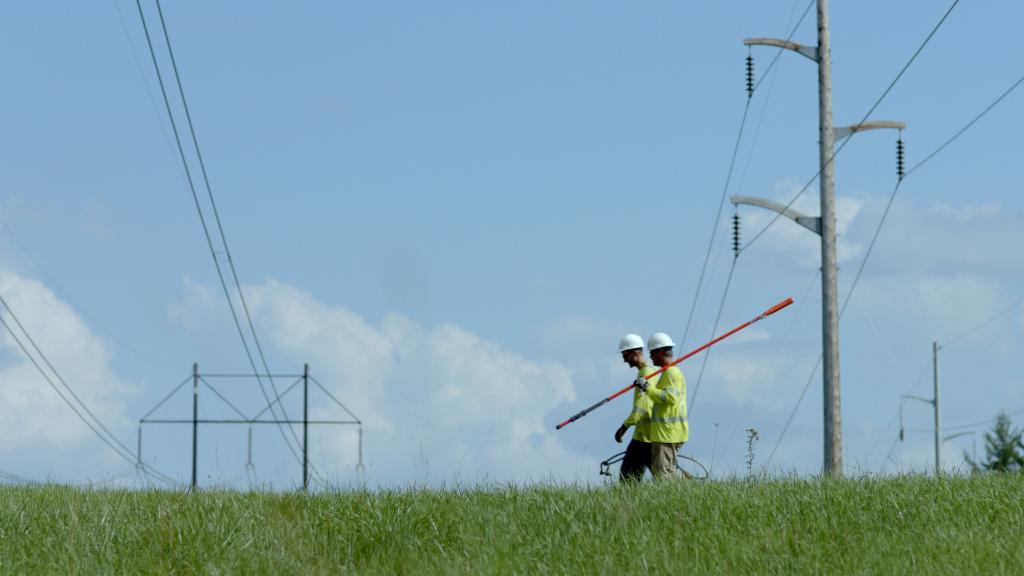By NANCY WEST, InDepthNH.org
CONCORD – Northern Pass filed a reply brief with the state Supreme Court on Wednesday arguing various points that opponents have made in their objections to the project’s original appeal that was filed in February.
The Site Evaluation Committee denied the $1.6 billion, 192-mile powerline from Pittsburg to Deerfield to bring Quebec hydropower to Massachusetts on Feb. 1, 2018, after 70 adjudicative hearings.
Developer Eversource and Northern Pass appealed the seven-member committee’s denial of its application to build the controversial powerline to the state Supreme Court in February, and several intervenors filed objections to Eversource’s appeal soon after.
Oral arguments are scheduled for May 15 at the state Supreme Court in Concord.
In its reply brief Wednesday, Eversource pointed to multiple briefs filed by opponents indicating there was nothing unusual or irregular about the decision to deny the application based on Eversource’s purported failure to satisfy the burden of proof.
“In fact, as the Applicants have shown, the Orders are the product of a truncated process in which the (SEC), with an eye to this appeal, failed in its statutory obligations and left the Applicants and this Court to guess at the reasoning underlying its action—as well as what is required to meet the burden of proof,” wrote attorney Wilbur Glahn representing Eversource.
The SEC found on Feb. 1, 2018, that Northern Pass had the technical and financial capability to build the project but stopped deliberating after deciding Eversource hadn’t proved that it wouldn’t interfere with the orderly development of the region.
The committee didn’t decide the other two facets of the law that must be met to issue a certificate to build: whether the project would have an unreasonable adverse effect on aesthetics, historic sites, public health and safety or whether the project was in the public’s interest.
Glahn’s reply brief said the SEC failed to consider all of the evidence, failed to consider mitigating measures or evidence, failed to weigh $1.5 billion in project benefits, and didn’t explain key standards or what was necessary to satisfy them.
The brief defined opponents to include the intervenors that filed opposition briefs or memos to the state Supreme Court: Counsel for the Public; Municipal Groups 1 South, 2, 3 South and 3 North; McKenna’s Purchase Unit Owners Association; Society for the Protection of New Hampshire Forests; and NGO Intervenors. In addition, memos were filed by Municipal Group North 1 and Daryl and Bradley Thompson, et al.
“The opponents do not challenge Northern Pass’ core argument: the SEC failed in its statutory obligation to weigh the significant benefits and impacts of this project,” Glahn wrote.
Eversource’s main appeal points to what it calls failure on the part of the SEC to do the work required by law and its own rules. Eversource argued that the SEC strayed from normal procedures and made an arbitrary and unreasonable decision.
It mentions, too, that the SEC failed to weigh the project’s benefits against its undue impacts.
“Instead, in its haste to be done, it elected to cut short deliberations, seize on the applicants’ purported failures to satisfy hitherto nonexistent burdens of proof, and concluded that it had no obligation to go further,” attorney Glahn wrote.
“This resulted in an unlawful, arbitrary and unreasonable decision.”
Eversource asked the Supreme Court to vacate the SEC’s order and remand the case back with instructions to make all the statutory findings, apply clear standards, consider all evidence and mitigations, and weigh the benefits and impacts of the project.
Concord’s Deputy City Solicitor Danielle Pacik wrote in an opposing brief for the joint municipal groups placing the blame for the SEC’s denial with Eversource.
“The applicant may be disappointed that its project was not approved, but the denial of the certificate was its own fault.
“That a large number of municipalities ‘vehemently’ opposed this project reflects that this proposal was not well designed from the beginning. The applicant wanted to install ‘large industrial’ overhead utility lines that would cut across the state and it disregarded the concerns raised by municipalities about how this would impact the character of their communities. This plan deserved to fail,” Pacik wrote.
In its opposition brief, Intervenor McKenna’s Purchase Unit Owners Association concluded: “In the end, the Applicants played a cynical game of dice and lost.
“In an effort to minimize their mitigation costs, they bet that the SEC would accept the opinion of Chalmers that the Project would have no discernable effect on property values. The SEC did not find Chalmers’ opinion to be credible.”
McKenna’s Purchase group went on: “It is no wonder that the SEC denied the Applicants’ Motion for Rehearing and attempt to expand the record. Now, through this appeal, the Applicants are again effectively seeking to reopen the record to introduce new evidence to compensate for the deficiencies in their Application before the SEC. The SEC did not buy it and neither should this Court.”
Northern Pass was initially chosen for the Massachusetts clean energy project to transport Hydro-Quebec power to the Bay State but was abandoned in favor of a similar project through Maine after New Hampshire regulators turned down Eversource’s application.





